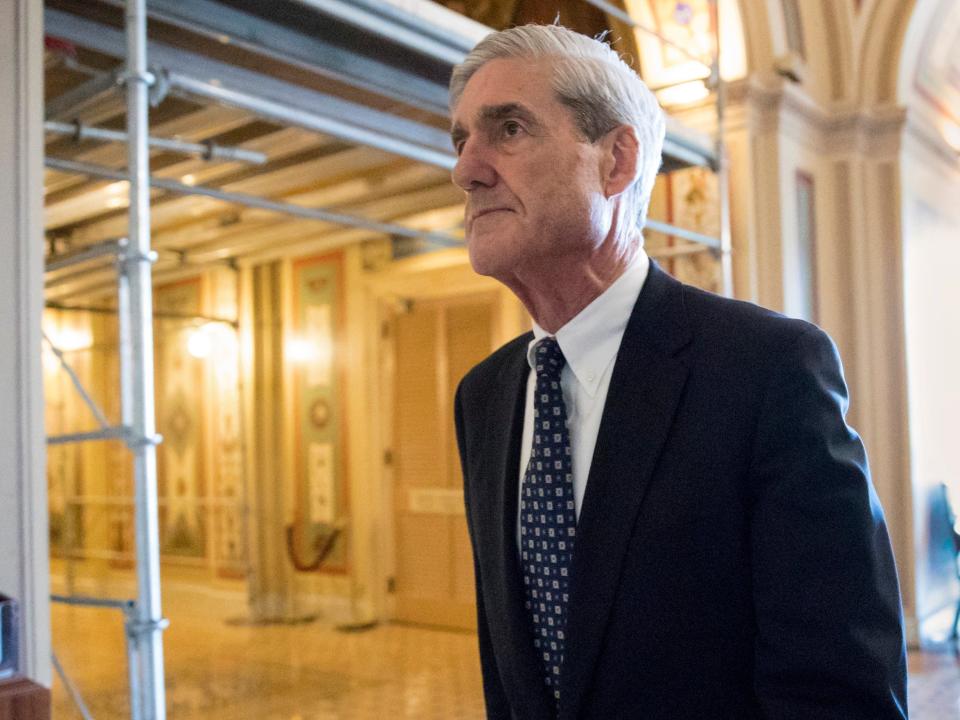Mueller report: Special counsel finishes Russia-Trump probe and submits findings to attorney general
Special counsel Robert Mueller did not recommend any further charges as he submitted his long-awaited report on his investigation into Russian meddling in the 2016 US election.
The findings, which remain confidential, were delivered to attorney general William Barr, via the office of his deputy Rod Rosenstein who has been overseeing the inquiry.
Mr Barr, who was chosen for the role by Donald Trump last year, will decide how much of it to share with Congress. In a letter to congressional leaders he said that he thought he would be able to inform them of the key findings this weekend. He planned to write his own account of the findings, he added.
“I am reviewing the report and anticipate that I may be in a position to advise you of the special counsel’s principal conclusions as soon as this weekend,” he wrote, pledging a commitment to transparency.
With no details released at this point, it is not known whether Mr Mueller’s report answers the core questions of his investigation: did Mr Trump’s campaign collude with the Kremlin to sway the 2016 presidential election in favour of the celebrity businessman? Also, did Mr Trump take steps later, including by firing his FBI director, to obstruct the probe?
However, a senior Justice Department official said Mr Mueller did not recommend any further indictments, suggesting no more criminal charges will be brought against the president or his associates.
The White House said it had not seen or been briefed on the special counsel’s document. What happens next is “up to attorney general Barr”, said spokeswoman Sarah Sanders.
Mr Trump was at his Mar-a-Lago property in Florida when the Justice Department announced delivery of the report.
Senior Democrats Nancy Pelosi and Chuck Schumer said it was “imperative” to make the full report public.
“The American people have a right to the truth,” the house speaker and senate minority leader said in a joint statement. ”The White House must not be allowed to interfere in decisions about what parts of those findings or evidence are made public.”
Democrats also expressed concern that Mr Trump would try to get a “sneak preview” of the findings.
Mr Barr has said he wants to make as much of the report public as possible, but any efforts to withhold details will prompt a tussle between the Justice Department and politicians who may subpoena Mr Mueller and his investigators to testify before Congress. Such a move by Democrats would probably be vigorously contested by the Trump administration.
The conclusion of Mr Mueller’s investigation does not remove legal peril for the president as he faces a separate Justice Department investigation in New York into hush money payments during the campaign to two women who say they had sex with him years before the election.
He has also been implicated in a potential campaign finance violation by his former lawyer, Michael Cohen, who plead guilty to his role in the payments and alleged that the president asked him to arrange the transactions. Federal prosecutors, also in New York, have been investigating foreign contributions made to the president’s inaugural committee.
Mr Mueller also secured convictions against Mr Trump’s former campaign chairman Paul Manafort who cheated banks and dodged his taxes and his national security adviser Michael Flynn, who lied about his Russian contacts, and a campaign aide who misled the FBI about his knowledge of stolen emails. Another Trump confidant, Roger Stone, is awaiting trial on charges that he lied about his pursuit of Russian-hacked emails ultimately released by WikiLeaks.
Mr Trump has increasingly tried to undermine the probe by calling it a “witch hunt” and repeatedly proclaiming there was “No Collusion” with Russia. But the president also took certain acts as president that caught Mr Mueller’s attention and have been scrutinised for possible obstruction.
Although the president criticised Mr Mueller’s team, his White House and campaign produced thousands of documents for the special counsel, and dozens of his aides were interviewed. The president submitted written answers to Mr Mueller regarding the Russia investigation, but he refused to be interviewed.


